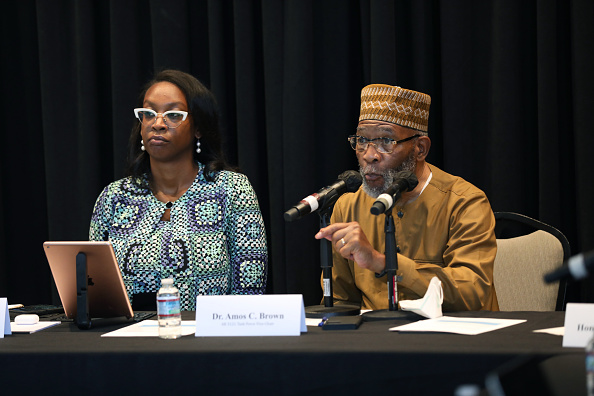MEMBERS OF California’s reparations taskforce have handed in a historic document that aims to begin the process of reparatory justice for millions.
The 1,100 report details how centuries of racism and slavery have impacted African-American in the West coast state and throughout America.
California’s Reparations Task Force meeting earlier this week was the final stage of addressing inequalities with the nine-member panel presenting up to 100 recommendations.
One of them included that California state legislators should set aside funds to pay African American residents of the state in the form of compensation.
A final monetary amount was not identified by the panel, but they are working with economic methodologies to make up for years of over-policing, disproportionate incarceration and housing discrimination in California.
Rev. Amos C. Brown, a longtime civil rights activist and vice-chair of the task force, said California’s projected $31.5 billion budget deficit hit back at possibility that it should stop the state from paying compensation to African-Americans.
“This state has committed a crime against Black folks, and it’s time for them to pay. Deficits don’t last always,” he said.
The taskforce and a 200-strong crowd were in lively spirits at the historical document’s completion in Sacramento with chants and cheers.

Those in attendance included lawyers, educators, elected officials and civil rights leaders whose ancestors were enslaved.
Lisa Holder, a civil rights attorney and task force member, said: “This book of truth will be a legacy, will be a testament to the full story.
“Anyone who says that we are colour-blind, that we have solved the problem of anti-Black animus and racism, I challenge you to read this document.”
The taskforce was set up after George Floyd was murdered in May 2020 and ignited worldwide Black Lives Matter protests.
California Secretary of State Shirley Weber, who the wrote legislation creating the task force, said slavery took away her identity and heritage, adding she has visited Africa many time but has nowhere to go back to .
She said: “I am an American. This country has shaped and formed us and we have given to it. And we have a right to be here. We have a right to have the benefits”.
Federal reparations movements in the US have faced multiple stumbling blocks but are now accelerating the work similar to the UK and Caribbean movements, even posing new questions for reparations throughout Europe.
The recommendations include tackling policies and practices that have led to Black Californians being disproportionately stopped by police, killed by law enforcement or imprisoned.
As well as putting an end to the death penalty, ensuring the police undergo anti-racism training and African-American being offered more funding for law education.

